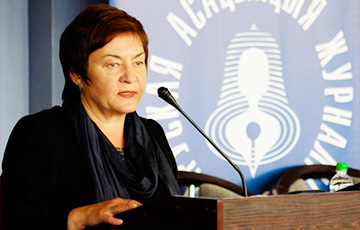Zhanna Litvina: Twelve journalists have been tried this year. Is this “positive signal”?
2- 20.05.2015, 16:32
- 18,412

Photo: gazetaby.com
The authorities do everything possible to “cut off oxygen” to the Belarusian sector of the Internet.
Zhanna Litvina, a former head of the Belarusian Association of Journalists (BAJ), said to charter97.org that the epoch of the free Internet in Belarus ended. The events of the last week – warnings to media outlets and reports about the purchase of equipment for blocking – clearly indicate it. Restricting access to free information against the background of a flow of Russian propaganda can lead to serious consequences in society.
– Unfortunately, it means that we must say goodbye to the illusions of “disobedience”, when we had an opportunity to post and receive free information on the Internet, when the Internet was developing actively inside the country. Let's look at statistics: we have more than 4 million Internet users plus 2 million who actively use social networking sites. The authorities apparently felt a threat that the Internet and such amounts of uncontrolled and uncensored information may pose.
It is the most probable reason for tightening control.
– When did the Belarusian authorities begin to destroy the free information space?
– I think the starting point is December, when amendments to the law on the mass media were adopted. The amendments gave huge power to the minister of information in what concerns blocking websites. What is the most important and alarming is that sites can be blocked without a trial. The amendments allow skipping such a step.
Another reason is the upcoming election campaign and presidential elections. The authorities will do their best to set a barrier for information.
– President of the European Council Donald Tusk said today about a “new type of relations” between the EU and Belarus. He mentioned, in particular, some “positive signals from Minsk” and noted that the EU was ready to make “a number of unusual steps forward” if the trend would continue. What positive signals does he mean if the situation of the mass media continues to deteriorate?
– It's a pity that Tusk didn't decipher his remark, because the biggest problem we have now is political prisoners, first of all Mikalai Statkevich and his confinement conditions. We cannot speak about the improvement of the situation as long as the problem exists. If we speak about freedom of speech and expression, we don't have any progress there either. On the contrary, we observe the increased pressure on and prosecution of journalists who publish their articles in foreign media. Twelve journalists who worked without accreditation have been tried and faced administrative sanctions this year. The total amount of fines is over $5,000. It is big money for Belarus. The very problem is artificial, I think, because it is on the verge of absurd to deny accreditation to a journalist because he worked without accreditation before and then try him for that.
We also have problems of freelancers, access to information and working conditions for journalists. We have plenty of problems. Unfortunately, they aggravate in the period when our information space became vulnerable to propaganda influence. The minister of information said lately that we had an “open information space”. But I insist that it is open for only one direction, the direction of Russia. Propaganda hits our mind, wakes up our imperial ambitions and make our people disoriented. Such processes can have very serious consequences.
– Could you describe the situation of state-owned media? Do they feel the influence of the flow of propaganda from Russia?
– The only stable media in our country are state-owned media. On the one hand, the authorities support them through public funding and mandatory subscription for state-owned companies, but on the other hand, they are controlled by the state, which can interfere with and regulate their work. These media disclaim responsibility and cannot resist propaganda, let along compete with it. They are so helpless because they wait for orders from above.
– Can the world community help us with resisting the destructive measures of the Belarusian authorities so that Belarusians can further have the right to receive true information as fast as possible?
– There's only one way out. According to our research, the audience of independent media is the most resistant to propaganda. I think we should concentrate our efforts on developing channels, free speech space and standards of the independent media. We need to distinguish ourselves from “soldiers” of information wars who apparently call themselves journalists. We need to develop a strategy aimed at making and strengthening high-quality journalism.










